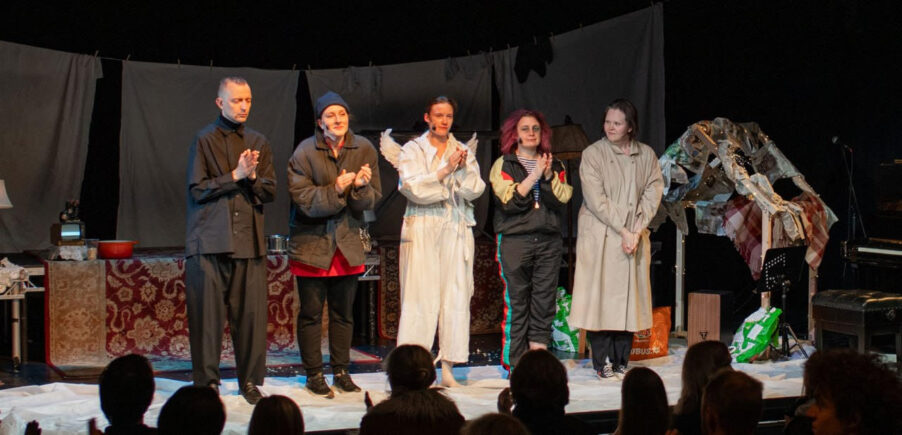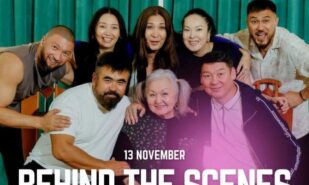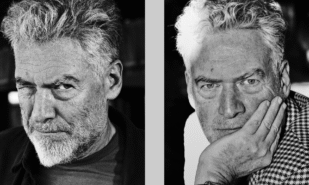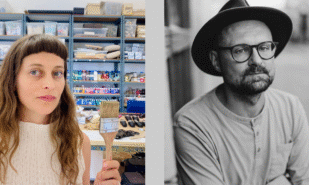The play “Our Treasure” by Evgenia Berkovich was shown in London. Last week, Chameleon Theatre brought “Our Treasure” to London—a Christmas parable from the independent theatre project “Daughters of Soso.” The touring performances took place at the Jerwood Vanbrugh Theatre. This was apparently one of the last showings of “Treasure.” Director Zhenya Berkovich decided to close the play after writing a letter from confinement: she and playwright Svetlana Petriychuk have been in prison for over one and a half years. Zhenya was sentenced to six years in a general regime colony for justifying terrorism through her play “Finist the Bright Falcon.” The premiere of “Our Treasure” took place on December 24, 2022.
How to Breathe Warmth
Do you know about a trend in education—the Steiner school? Children grow up with almost no separation into grades—older kids help the younger ones, younger kids teach patience to the older ones, and together they eat apple pies, sculpt with wax, study nature, engage in special gymnastics that develops the mind, motor skills, and body, and they grow and reach for humanism. Sometimes it seems: Steiner invented all this without dividing participants into adults and children because adults might need this wax, magic, crystals, interaction with nature, and geography with Latin even more.
What does Steiner with his anthroposophy and esoteric Christianity have to do with this? What does he have to do with a play staged in Russia in ’22? Strangely enough, “Our Treasure” is both a Christian parable and a timeless message about love—the play is permeated with Christian love, filled to the brim with it, it shines and glows. And its playful tone prevents the parable from collapsing into concrete-heavy sanctimonious seriousness, turning it into a tender—but very recognizable and everyday reality, not a story dictated by pointing fingers and carved in granite as a moral and tradition for descendants.
I really want to say that “Our Treasure” is like a New Year’s tree for adults. As Steiner placed his students within the safe walls of his schools, so Berkovich and her actors place the audience in a safe space. Well, you know, Herod (“the stronger, the truer, the more inevitable the miracle”), so—Herod will not win anyway because there is an angel here, and although he should not, he will still help. He will sprinkle magical feathers—and the blind will see, the foolish will gain wisdom, the drunk will sober up.
The play has several layers of meaning, and if the viewer does not grasp one, they see the second, the third, the fifth. It’s not scary not to catch references to modern YouTube journalism because there are many other meanings. They open up like windows of an advent calendar, these recognizable touches to the portrait of our time.
The story of the birth of the Infant is transferred to familiar decorations. A trash can, bags from “Pyaterochka,” plaid trunks, diapers. Carpets, an ironing board with swaddling clothes, an iron, a portable TV. A simple recognizable everyday life. Three young women, three infants. Births, doctors, a biased and terrible interrogation about menstruation, miscarriages, the beginning of sexual life (a terrible interrogation, humiliating, but everyone answers sweetly—such are the rules). Pain—and an encounter, turning life around—with a new person. With a child, in each of whom a mystery has occurred—but only if you talk about it so loftily, without a drop of irony, then all the tenderness and joy of the play is lost.
Here’s Ment, a clear relative of Prigov’s Policeman, clad in a huge luxurious fur coat, adorned with “gifts” (read—bribes) like a New Year’s tree. He’s even a bit in lights. At places. Here are two sheep in little white mittens and fashionable hats cheerfully shouting about freedom from the flock, yet they themselves can’t even agree on which direction to go. But amazingly, there is zero parody and malice in this. It seems as if this is a precisely made cut of time, society, and its signs—but “Our Treasure” is not a specimen for examination under a microscope, not a cruel documentary, it is a small, tender miracle, completely defenseless before the viewer—and in its defenselessness, incredibly strong.
An ass in a black leather cloak breathes longingly into the hall, striving to “breathe warmth,” to warm the house where an infant is about to appear—this is reliably known to the camel. Generally, belief in miracles here is inherent in the animals—and the donkey, and the ox—a funny one, in a cute spotted coat. They are terribly funny, but so touching that you can’t tell whether to laugh or cry, at them—or at yourself?
And again—pregnant women, an ironing board, pots. Rugs, “nets, bags, tote bags, pouches”—yes, yes, without Brodsky, as the main poet of the generation of today’s 30-40-year-olds, it would not do. Three Magi in silly hats stand in the middle of the city square, habitually arguing about the purpose of the journey—but none of them really thinks of going to Herod afterward. They argue, find out who has the whiter coat, and one of them keeps reading poems, melodically, with a characteristic rolling ‘r’. The exiled poet limps on his promenade of the Incurables, and will not hand anyone over for consumption. He will drop a box stuffed with diapers and creams for diaper rash and leave, and only a star will remain over the city. A mirror ball hangs over the stage, over the street, over the whole city. It slowly rotates and sends beams into every window where a “little, soft son” was born, or will be born, or will be conceived. For a Miracle, it does not matter.
Three actresses – Ira Sova, Marietta Tsigal-Polishchuk, Natasha Gorbas – switch roles rapidly, changing costumes and, it seems, their own psychophysics. Future mothers, maternity hospital patients suddenly become Magi, animals—they jump onto the stage like puppet show dolls, which is not surprising, since “Our Treasure” is, in essence, a nativity play.
In the corner of the stage stands a structure, more like a puppet box. Inside it glows and flickers a bar chimes, whose owner (as well as all the other instruments, including a melodica, ukulele, steel tongue drum, piano) leads the play (Svetlana Speranskaya), supporting, embracing it with music, and here too Steiner, it seems, would be happy, because in Steiner education, musical experience is such a way of experiencing the world. In “Our Treasure,” the sound score is inseparable from what is happening. And for this world, the sweetest voice, calling people to the census of male infants and promising a box of “Our Treasure!” means as much as the noisy (if not to say howling breath of the donkey and the deep chuckles of the ox), and the hypnotic matter of reading poems.
“The main principle of free people is to live in love with our actions and allow to live in the understanding of another person’s will,” wrote Steiner. Will here is endowed to everyone—the donkey and the ox, the Magi and future mothers. It seems only Herod is deprived of it, as he is deprived of love, because love and will only go hand in hand.
A day after the end of the London tour, the actors of the theatre returned to Russia: Zhenya Berkovich and Svetlana Petriychuk faced another trial. The appellate military court in Vlasikha began consideration of the appeal against the sentence. The result of the session, which took place on December 16, was a decision to postpone the meeting to December 25. By then, “Our Treasure” will be two years old. Only they will no longer play it.









